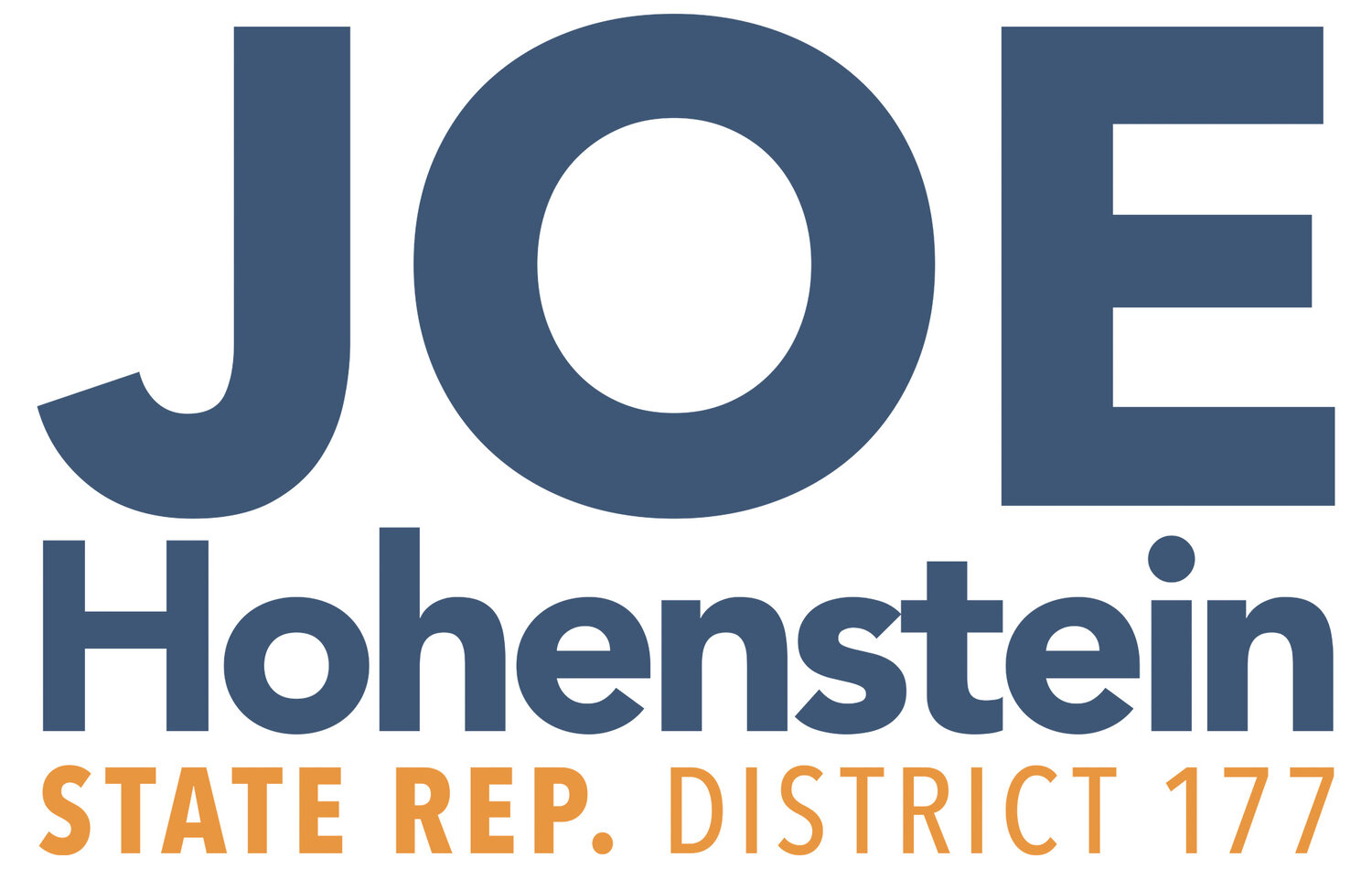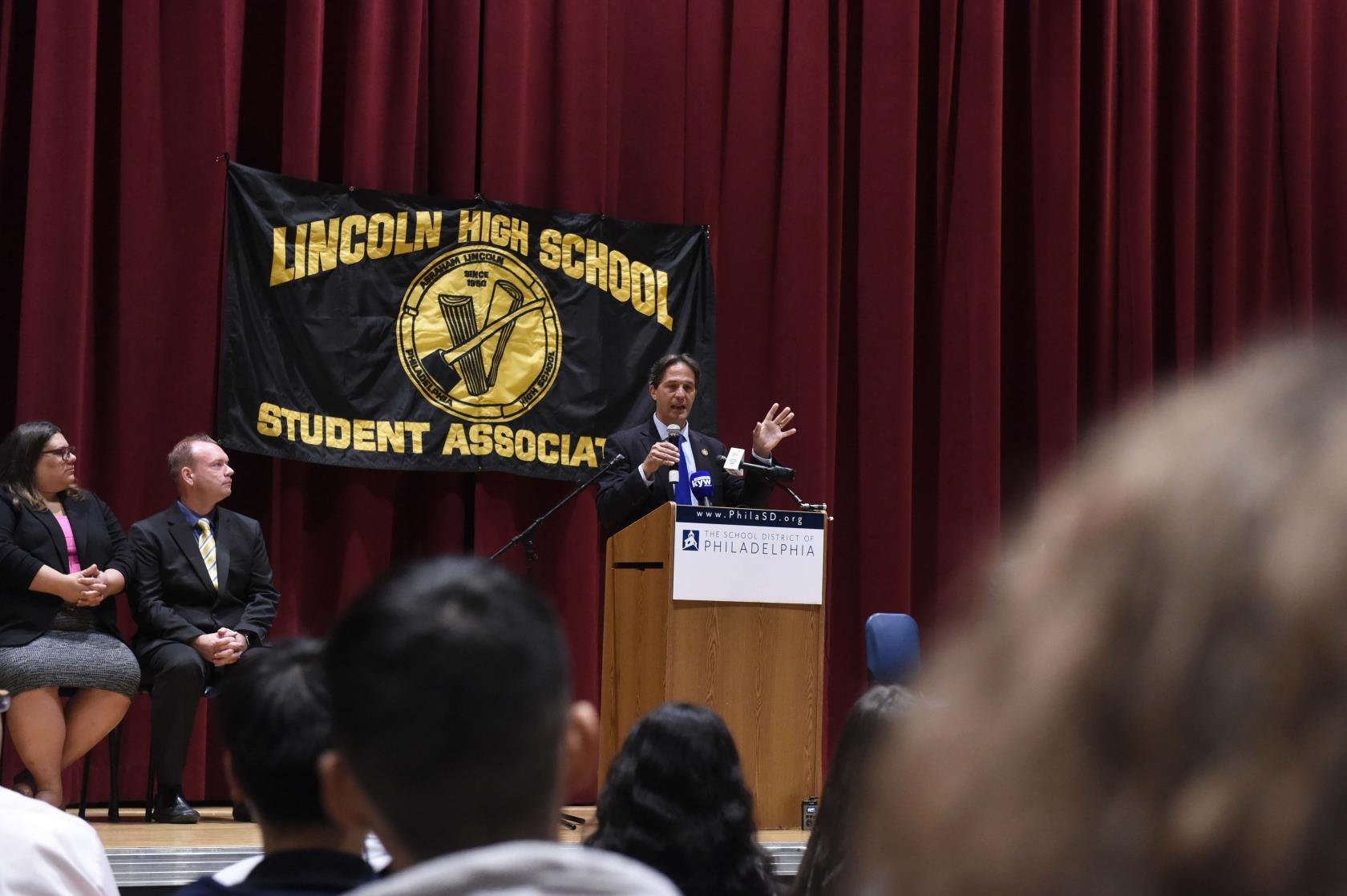Fighting For Fair Education
Joe believes legislators shouldn’t play petty politics when it comes to the education of Pennsylvania's youth. The core of Joe’s education platform centers around:
Fair funding of public schools, regardless of the socioeconomic status of those living in a given school district
Greater accountability for charter schools and reforms to charter lottery systems
A new model for governance of the School District of Philadelphia
Fixing our crumbling school infrastructure
Supporting our teachers and other essential school workers with more resources and better pay
WATCH: Joe is Fighting for Fair School Funding
Joe attends a labor fair at his alma mater, Frankford High School. (Nov. 2021)
Supporting Philadelphia’s Public Schools
Joe is a product of Philadelphia public schools (Masterman Junior High & Frankford High School) and his father was a member of the Philadelphia Federation of Teachers from the 1970’s through the 1990’s. Joe understands we must do more to support our public schools, and he believes that school reform starts with a solid, quality public system supplemented by other educational models. For almost ten years, Harrisburg has put a stranglehold on millions of dollars which should have gone to public schools in Philadelphia. If re-elected, Joe will continue to fight for adequate education funding for all of our children.
Fair Funding
Pennsylvania’s school funding system is inherently broken. While the latest budget is an improvement, our public schools are still drastically underfunded on the whole. It is among the worst in the country, and has been called “the nation’s most inequitable” due to the fact that the school districts with the highest poverty rates receive one-third fewer state and local tax dollars per pupil than the wealthiest districts. This imbalance violates the Pennsylvania Constitution (Article 3, sec. 14) and is harmful to our society. The lack of adequate funding over the years has resulted in many of the other problems facing our schools, such as toxic crumbling infrastructure, a lack of educational and social resources, poor communication between administration and families, and unacceptably low levels of support and compensation for teachers and other essential school workers.
Joe presents state grant awards to several School District of Philadelphia schools. (Oct. 2019)
Joe has worked to implement a funding formula similar to the one put forth by the Basic Education Funding Commission and ensure that all students in Pennsylvania have equal access to the resources they need to learn. Further, Joe supports a community school model that would provide families of all socioeconomic statuses with the resources to help their children thrive by establishing school-based hubs of parental support, health care services, childcare and after-school services. Joe supports creating funding avenues for districts where this model would be effective, especially in Philadelphia. A central element of any new funding system will have to include separation of funding streams for public school districts and charter schools receiving public funds.
Improved charter accountability and lottery system reforms
While there are many well-run and effective charter schools across Pennsylvania, there have been numerous instances of mismanaged funds, fiscal irresponsibility, and outright corruption. Joe believes charter schools should be held to the same standards to which any entity receiving money in the public trust would be held accountable. Joe has supported amendments (which were blocked by the Republican-led Legislature) that would have made charter schools more locally controlled, better for kids, and more responsible to taxpayers. Joe would also work to reform the lottery systems under which many charter schools operate. Lottery systems are often a form of segregation, and the admission process for charter schools needs to offer a level playing field for all students.
Establishing the Right Governance Model for the Philadelphia School District
The School District of Philadelphia needs more local control. A few years ago, the School Reform Commission finally recognized that fact when it decided to dissolve. The blank slate provided by that dissolution was squandered when the new School Board consisted of appointments from a single source - the Mayor of Philadelphia. Although most of the appointed members are people of high quality and ethical standards, the process was flawed. All governmental entities must be held accountable in ways they currently are not. The current Board cannot become the final structure.
Joe supports a different model for Philadelphia School District governance, similar to one put forth by the Education Voters PA. The model would include both appointed and elected members, creating a nine-member board. The governor, members of the Philadelphia General Assembly delegation, the mayor, and City Council would all have the ability to appoint a member, giving each of these entities skin in the game. The people of Philadelphia would have the ability to elect the remaining members. By giving voters the ability to choose members, as well as vote them out, the board will inevitably be held to a higher level of accountability and responsibility than it is now. Giving elected officials—such as the Mayor and Governor—the ability to directly appoint members would also give these stakeholders a direct line into the operations of the District.
The defining issue for the School District of Philadelphia has been the inability to consistently secure the financial resources to provide a quality education for all of its students. This model keeps the state involved but also would increase accountability for those on the board. It is a model that provides the best opportunity for transparent and accountable governance for Philadelphia’s troubled district. It is a model that provides Philadelphia with the best opportunity to fulfill the vision of each child having an opportunity to attend the right school for them.
Disability-Inclusive Curriculum
This year the State House passed the Education Code bill (H.B. 1642) which incorporated legislation by Joe and Rep. Jason Ortitay (R-Washington/Allegheny) that encourages Disability-Inclusive Curriculum in schools across the commonwealth. For those of us who live with disabilities, this is a huge victory.
More than one in four people are disabled in the United States. The disabled community is diverse – from the physically disabled who were the earliest voices; to those with sensory disabilities like deafness and blindness who focus on language and communication access; to people living with intellectual disabilities who are proving their worth and value in employment and other areas of society; to folks with hidden disabilities of mental illness who are often still in the shadows.
As a person who is hearing-impaired, Joe understands firsthand how a disability can be stigmatized. Joe felt that stigma throughout his youth, uncomfortably aware of his visible hearing aid. Joe hopes that with Disability-Inclusive Curriculum we can come closer to celebrating disability and diversity with pride and we can bring about inclusion in our society, as well as a sense of internal pride and celebration in our differences. It is a shared truth that exclusion and failure to talk about diversity breeds stigma, shame, ignorance and misunderstanding. Every child deserves to be seen, and it is important that everyone in our society is recognized for the gifts and skills they have to share, and if we stop and take a moment, we will see that many people who have lived at the margins of our families, our classrooms, and our places of power like government and business have much to teach us. We just have to be willing to learn. The experiences of all our students will be enriched by knowing these stories and their impact on all our lives.




